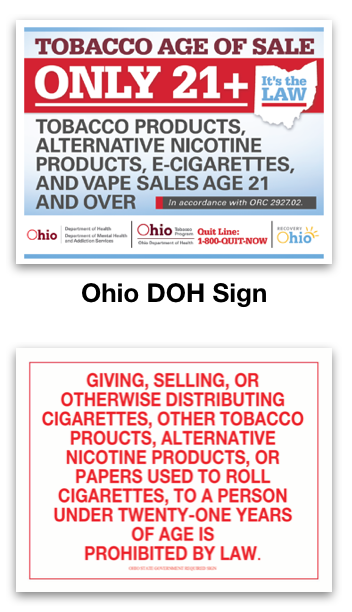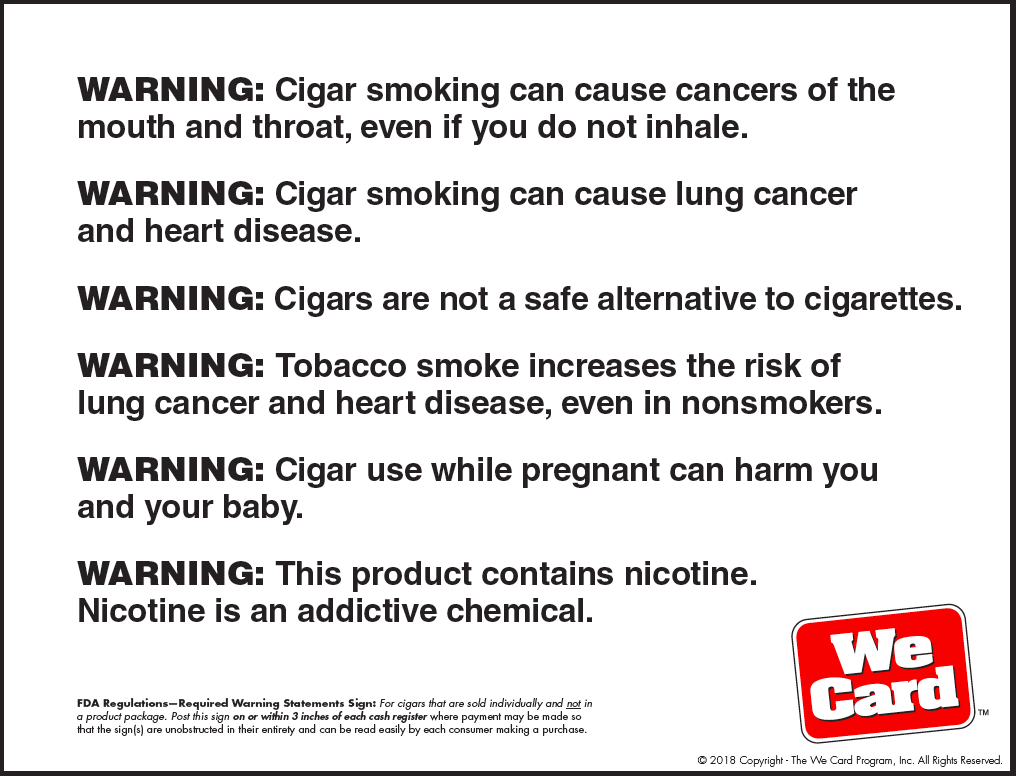State Summary
State
Customers must be 21 years or older to purchase tobacco products, e-cigarettes and e-vapor products (See Restricted Products section). It is illegal to give, sell or distribute cigarettes, other tobacco products, alternative nicotine products, or papers used to roll cigarettes to any person under 21 years of age. Persons under 21 years of age may handle Restricted Products in the course of employment.
Electronic Age Verification: A seller may use electronic age verification before selling or distributing Restricted Products. If the verification does not match the ID or indicates that the ID is false, the sale or distribution shall not be made. Violators may be fined up to $1,000 per violation. A seller shall not record any information derived from a transaction scan except the name, birth date, and card expiration date and identification number. A seller may not disseminate this information, except by court order. Violators may be fined up to $1,000 per violation.
Federal
Deny sales to anyone under 21 years old for FDA regulated products (SEE Restricted Products section).
Note: The new federal 21 year minimum-age for FDA regulated products of all tobacco and vaping products (SEE Restricted Products section) was declared immediately effective on December 20, 2019. This law allows for no exceptions.
You must Check photo ID of everyone under age 30 who attempts to purchase FDA regulated products and verify the customer is of legal age to purchase. This is an each-and-every time requirement (even if you know the person to be of legal are.) If you "carded" them yesterday, you must "card" them again today!
Decline a sale when the customer is underage, has no photo ID, the photo ID contains no date-of-birth or the photo ID has expired.
State
Tobacco products include, but are not limited to, cigarettes, clove and hand-rolled cigarettes, cigars, pipe tobacco, electronic cigarettes, hookah, vaping pen, electronic smoking device, alternative nicotine products, chewing tobacco and snuff, or cigarette rolling papers.
It is illegal to manufacture, sell, or distribute any pack or other container of cigarettes containing fewer than twenty cigarettes or any package of roll-your-own tobacco containing less than six-tenths of one ounce of tobacco. It is illegal to sell cigarettes in a smaller quantity than that placed in the pack or other container by the manufacturer is prohibited.
Federal
FDA regulations apply to these tobacco products defined under the Tobacco Control Act as any product made or derived from tobacco or containing nicotine from any source (e.g., synthetic nicotine) that is intended for human consumption.
- Cigarettes, cigarette tobacco, and roll-your-own tobacco
- Do NOT break open cigarette packages to sell products in smaller amounts.
- Do NOT sell single cigarettes, also called "loosies."
- Do NOT sell cigarette packages containing fewer than 20 cigarettes.
- Do NOT sell flavored cigarettes, cigarette tobacco or roll-your-own tobacco (other than menthol or tobacco.)
- Only sell in a direct face-to-face exchange*.
- Smokeless tobacco
- Do NOT break open packages to sell products in smaller amounts.
- Only sell in a direct face-to-face exchange*.
- Do NOT sell without a health warning label.
- Cigars
- Hookah & Pipe tobacco
- Dissolvable tobacco products
- Nicotine gels
- Electronic Nicotine Delivery System (ENDS), which are products such as:
- e-cigarettes
- e-hookah
- ecigars
- vape pens
- advanced refillable personal vaporizers
- electronic pipes
- Components and Parts, such as:
- e-liquids**
- atomizers
- batteries (with or without variable voltage)
- cartomizers (atomizer plus replaceable fluid-filled cartridge)
- digital display/lights to adjust settings
- clearomisers
- tank systems
- flavors
- vials that contain e-liquids
- programmable software
- Do NOT give away free samples of any of these FDA regulated products or components and parts. EXCEPTION: Free samples of smokeless tobacco are only allowed in a "qualified adult-only facility" -- where no person younger than 21 is permitted to enter or be present (or a higher minimum-age if your state or locality has a higher age limit.)
- Do NOT sell in vending machines UNLESS you operate a "qualified adult-only facility" -- where no person younger than 21 is permitted to enter or be present (or a higher minimum-age if your state or locality has a higher age limit.) Some state laws prohibit tobacco product vending machines. Check your state law.
EXCLUDED from FDA regulation are accessories, such as: ashtrays, spittoons, hookah tongs, cigar clips and stands, pipe pouches, humidors.
* The sale of cigarettes, cigarette tobacco and smokeless tobacco through vending machines and self-service displays are allowed ONLY in adult-only facilities where no person younger than 21 is permitted to enter or be present (or a higher minimum-age if your state or locality has a higher age limit.)
** Retail establishments, such as vape shops, that mix and/or prepare e-liquids or assemble vaporizers are considered "tobacco product manufacturers." Many separate regulations will apply. See FDA regulations for tobacco product manufacturers at www.fda.gov.
State
A driver's license, military identification card, passport, or other identification card issued by the government.
Federal
Unless otherwise required by state or local law, FDA recommends that retailers accept only government-issued photographic identification with the bearer’s date of birth. (e.g., State-issued driver’s license or identification card, military identification card, passport or immigration card) for establishing a legal age to purchase FDA regulated products. The Photo ID is not acceptable if it has expired.
State
Violators will be charged with a 4th degree misdemeanor and fined $250 and/ or up to 30 days imprisonment for the first offense, and charged with a 3rd degree misdemeanor and fined up to $500 and/or 60 days imprisonment for second and subsequent offenses.
Federal
FDA has a variety of enforcement tools to address retailers who violate Federal statutes or regulations, including civil money penalties, warning letters, seizures, injunctions, no-sale orders and/or criminal prosecution. Retailers who violate the regulations may also be in violation of state law and subject to state penalties or other related orders.
State
An affirmative defense is available if a person under 21 years of age is accompanied by a parent, spouse or guardian who is 21 or older, or the person who gave, sold, or distributed to a person under 21 years of age is a parent, spouse or guardian who is 21 or older. An affirmative defense is available if: (1) a card holder attempting to purchase or receive Restricted Products presented an Acceptable Form of Identification; (2) a transaction scan of the identification indicates that the card was valid; (3) the Restricted Products were sold, given away, or otherwise distributed to the card holder in reasonable reliance upon the identification presented and the transaction scan. The Court may consider an employer-adopted and implemented written policy intended to prevent under-aged sales of Restricted Products as a defense.
Federal
Federal law provides that the FDA shall adopt regulations that may provide any retailer that implements the “approved training program,” a reduced civil money penalty if that retailer is found in violation. The FDA does not require training, but it recommends retailers train and educate their employees.
Until the FDA issues guidance or regulations on what constitutes an FDA “approved training program,” the FDA indicates “the agency intends to use a lower maximum civil money penalties schedule for all retailers who violate the regulations restricting the sale and distribution of cigarettes and smokeless tobacco products, whether or not they have implemented a training program. However, FDA may consider further reducing the civil money penalty for retailers who have implemented a training program.”
State
It is illegal for a person under 21 years of age to use, consume, possess, accept, receive, purchase or attempt to purchase Restricted Products, except when accompanied by a parent, legal guardian or spouse who is 21 or older, or to knowingly furnishing false information regarding name, age or other identification to obtain Restricted Products. Violators may be required to attend a youth smoking education program and/or receive a $100 fine. Restricted Products that are used, possessed, purchased or received by a minor are subject to seizure and forfeitures as contraband. Persons under 21 years of age may handle Restricted Products in the course of employment.
Federal
Not applicable under Federal law

State
Retailers must post a sign in a conspicuous place a legibly printed sign in letters at least one-half inch high stating that giving, selling, or otherwise distributing cigarettes, other tobacco products, alternative nicotine products, or papers used to roll cigarettes, to a person under twenty-one years of age is prohibited by law.
Violators will be charged with a 4th degree misdemeanor and fined $250 and/ or up to 30 days imprisonment for the first offense, and charged with a 3rd degree misdemeanor and fined up to $500 and/or 60 days imprisonment for second and subsequent offenses.
The Ohio Dept. of Health has provided this sign - Download the Ohio sign
We recommend that retailers also Download and post a sign with the required language.
Federal
Effective 8/10/18: For retailers who sell cigars individually without packaging, there is an FDA sign requirement. Download We Card's Sign
Alert: A U.S. District court overturned this regulation in February 2020. However, there are expectations this regulation will be revisited and may be reinstated after ongoing adjustments or legal matters before the courts. Therefore, retailers need to be prepared for this requirement IF it is required once the legal matters are resolved by the court.
Cigars Sold Individually without Packaging - Retailers who sell cigars individually, and not in a product package must post a sign at each point-of-sale that displays all six of the required warning statements per 21 CFR § 1143.5(a)(3). Each sign must be at least 8.5x11 inches in size; clear, legible, and conspicuous; printed in black Helvetica bold or Arial bold type or other similar sans serif fonts against a solid white background, in at least 17-point font size with appropriate spacing between the warning statements; posted on or within 3 inches of each cash register where payment may be made; and unobstructed in its entirety and read easily by each consumer making a purchase. The required warning statements on the sign must be: printed in a manner that contrasts, by typography, layout, or color, with all other printed material; and capitalized and punctuated as indicated above.

State
As a condition of receiving federal substance abuse block grant funds, federal law requires the state to conduct random, unannounced inspections of tobacco outlets to determine compliance. Random unannounced compliance checks are supervised by the Department of Public Safety; under the DPS supervision, compliance checks may be conducted by federal, state, local or corporate entities.
Federal
FDA conducts compliance checks of retail stores to determine whether retailers are complying with the new federal law, using:
- Attempted purchases of tobacco using underage customers.
- Inspections of stores for other compliance requirements.
- Inspections of stores in response to public complaints to the FDA’s request for the general public to report suspected store violations (1-877-CTP-1373 or AskCTP@fda.hhs.gov)
The FDA indicates that it will conduct follow-up compliance checks on stores found in violation.
State
Minor license is vertical, with a red header. The photo is in the top left and has a red border. Red "UNDER 18 UNTIL 00-00-0000" and "UNDER 21 UNTIL 00-00-0000" appear at the bottom right and overlap the duplicate ghosted photo. For additional information about minor licenses, go here.
Federal
Not applicable under Federal law
State
None
Federal
See additional information and requirements on advertising, labeling and promotion requirements -- available here.




